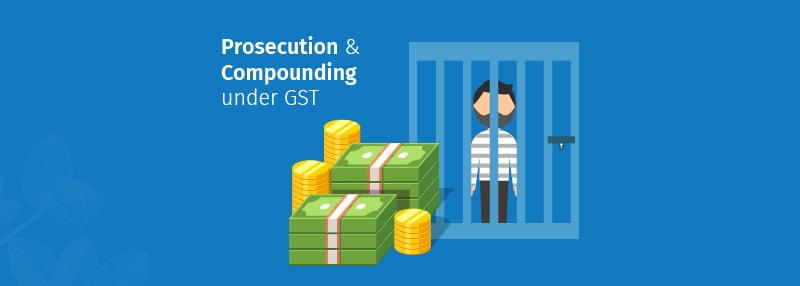Prosecution under GST
Prosecution, is defined as the act of conducting legal proceedings against someone, in respect of a criminal charge. Under GST, any taxable person who commits an offence amounting to deliberate intention of fraud, becomes liable for prosecution, or in other words, criminal charges.
Offenses liable to attract Prosecution under GST
The following are the offences, for which a taxable person can become liable for prosecution under GST:
- Supply of any goods and / or services without an invoice, in order to evade taxes
- Issue of any invoice without the supply of any goods and / or services, thus taking ITC or refund by fraud
- Collection of GST (even if it is done against the provisions), but failure to submit the same to the government, within the specified time limit of 3 months
- Obtaining of refund of CGST / SGST by fraud
- Submission of fake records or documents or filing of fake returns to evade taxes
- Obstruction of the proper officer during his duty, for instance, while conducting audit
- Acquisition or receipt of any goods and / or services with full knowledge that it is in violation of the GST rules, and is liable for confiscation
- Destruction of evidence
- Not providing information or providing false information during proceedings
- Helping any taxable person to commit fraud
Punishment for Prosecutable Offences
As per the provisions of prosecution in GST, the taxable person committing any of the above listed offences i.e. prosecutable offences shall be punished as follows:
| Amount of Tax Involved in Offence | Bail Applicability | Term of Jail |
| INR 100 to 200 Lakhs | Bail-able | Up to 1 year |
| INR 200 to 500 Lakhs | Bail-able | Up to 3 years |
| Above INR 500 Lakhs | Bail-able* | Up to 5 years |
*Note: However, if a taxable person commits the following offences and the amount of tax involved in the offence exceeds INR 500 Lakhs, then the offences will be deemed as non-bail-able:
- Supply of any goods and / or services without an invoice, in order to evade taxes
- Issue of any invoice without the supply of any goods and / or services, thus taking ITC or refund by fraud
- Collection of GST (even if it is done against the provisions), but failure to submit the same to the government, within the specified time limit of 3 months
Other specified punishments for Prosecutable Offences
- For obstruction of the proper officer during his duty, destruction of evidence, falsifying information during proceedings & helping another taxable person to commit fraud – Up to 6 months imprisonment with fine
- Repeat Offences – Up to 5 years imprisonment with fine
Compounding under GST
Compounding of offences under GST is a method, wherein litigation time, and time of judicial procedures can be cut down. Generally, in the case of prosecution for an offence in a criminal court, the accused has to appear before the Magistrate at every hearing by using the services of an advocate. Given, that court proceedings are both expensive and time-consuming, the accused taxable person may make use of the compounding provisions under GST, wherein, he will not be required to appear in Court personally. Also, under the same provisions, he may be discharged on the payment of a compounding fee, which will not be more than the maximum fine which can be levied under the relevant provisions of prosecution and compounding under GST.
However, compounding under GST will not be available to the following entities:
- Any taxable person who has already committed any of the offences mentioned under prosecution, detailed above i.e. repeat offenders
- Any taxable person who has committed an offence involving supplies above INR 1 Crore and has been allowed to compound before
- Any taxable person who is also being tried under other acts such as Narcotic Drugs Act, FEMA etc.
- Any taxable person convicted by a court under GST
- Any taxable person guilty of destruction of evidence, falsifying information during proceedings or preventing an officer from doing his duty
Amount Payable for Compounding under GST
Compounding in GST will be allowed only after the full payment of all taxes, interests and penalties which are due. As per the provisions of prosecution and compounding under GST, the amount payable for compounding under GST is defined as follows:
- Minimum Limit – 50% of the tax or INR 10,000 whichever is less
- Maximum Limit – 150% of the tax or INR 30,000 whichever is more
On payment of the compounding amount, no further proceedings shall be initiated against the accused taxable person for the same offence and all criminal proceedings, if already initiated, will be abated immediately. In conclusion, to avoid any kind of loss, businesses should be aware of the functioning of prosecution and compounding under GST.

2 comments on “Prosecution and Compounding under GST”
“The post was really helpful for me. Your writing skills are very collective and also i enjoyed reading the post of yours. i will surely share this post. cheers!!
Hi, thanks for this post it very helpful and keep sharing